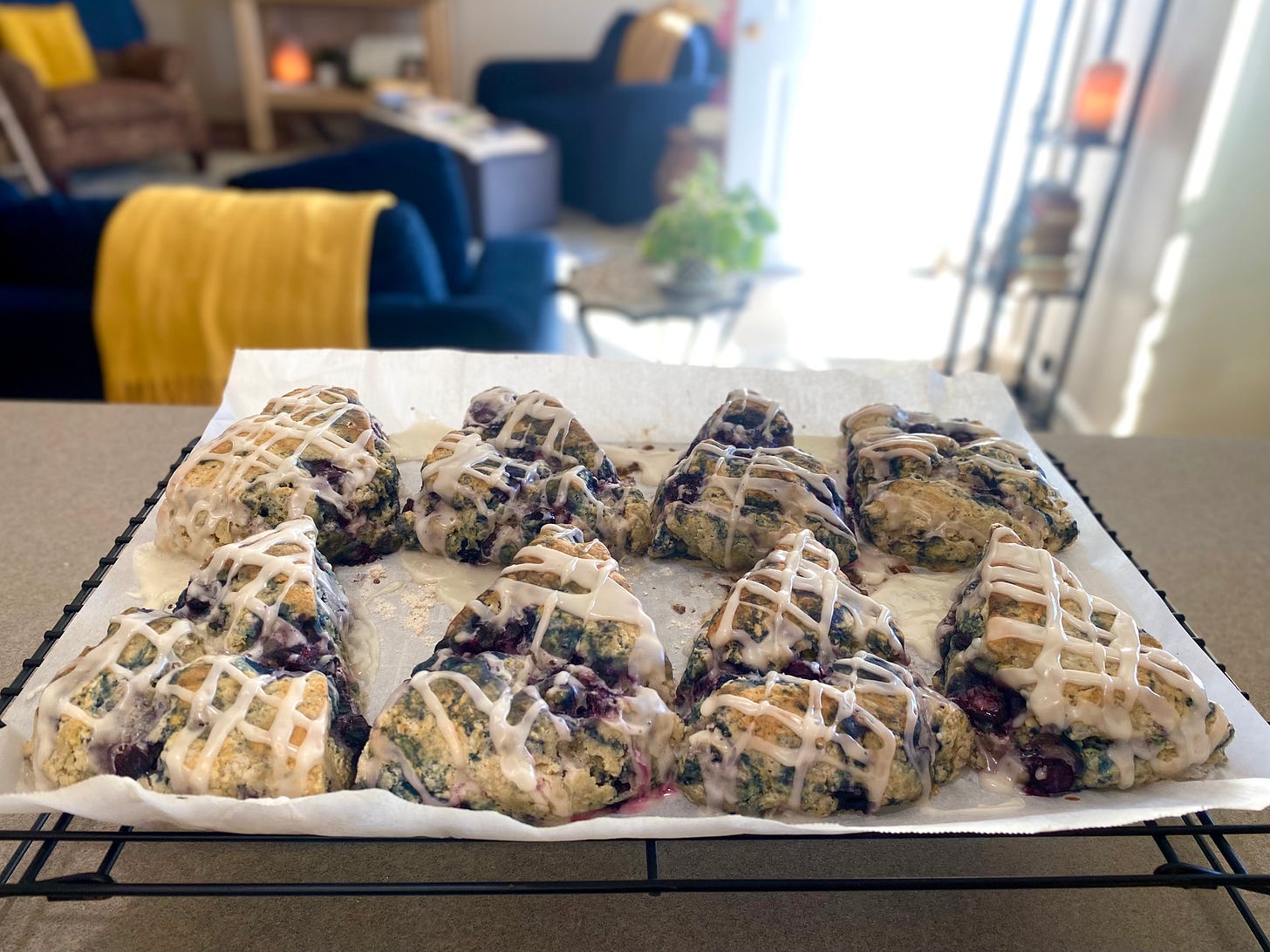Losing My Religion, Part II
Remembering to delight, cozying up to complexity, and encountering new pathways.
You’re talking about the American Dream. You find something that you love and then you twist it, and you torture it, and try to find a way to make money at it. You spend a lifetime doing that. And at the end, you can’t find a trace of what you started out loving.
— Harry Connick Jr., Hope Floats
A few weeks ago a dear friend shared an article with me about how good, beautiful things — specifically terms or phrases — can become tarnished.
In our correspondence she wrote:
If there hadn't been organized religion to lay on people the burden of all the extras, and we really had just stuck to loving God with all our hearts, souls, minds, and loving others as ourselves...what would the world - and the Church - look like today? Could we have done it? Or do we, at our core, really just want someone to give us rules to follow?
I repeated her words in a tearful whisper, “Could we have done it?”
The God who made the heavens, the galaxies, the earth and all it contains, every living being, the trees, the air we breathe, the water we drink — surely He orchestrated a better design than what we assembled.
Don’t forget delight
In my search for clarity, I considered two conduits of spiritual oversight that have added to my state of bewilderment with church. Discipline and mentorship are necessary tools in leadership, though the relationship I’ve often seen (and at times experienced) between the instructor and pupil primarily communicated, “I am helping you to become something,” while lacking, “I enjoy being with you.” In this scenario, the mentee feels unseen and confused. If the [person in leadership] doesn’t know me, let alone enjoy me, what drives him/her to care so much about how I behave? There’s an untenable disconnect.
Ideally, persons in leadership will find ways to know the people they’re shepherding. A real life, non-church example is my mom. She loves me and enjoys who I am as an individual. Because she knows and care about me, she finds appropriate ways to encourage and inform me as her adult daughter. If I didn’t think she liked me or knew me very well, or if she simply told me her opinion without inviting me into conversation, our relationship would be unbalanced and I wouldn’t trust her to speak into my life. Thankfully, though we live over a thousand miles apart, we put in the work to know each other well and enjoy a loving, mutually respectful relationship.
If a church has over a few hundred people, I’d wager it’s humanly impossible for one person to remember all the people’s names, let alone know their stories. Small groups have become a popular way for people to be known, and that setting is generally fruitful. In my experience, Sunday mornings can feel a bit like a spectator sport. And maybe that’s okay. I don’t know how they did it in the early church, but it probably looked a lot like small groups. Which makes me wonder … but that’s another subject.
The Good News is, Jesus came to earth, and He is coming again because “the dwelling place of God is with man. He will dwell with them, and they will be his people, and God himself will be with them as their God” (Revelation 21:3). One day we will get to be with the One who knows and loves us fully. Hallelujah.
Oh, the (complex) places you’ll go!
I do wonder what unites churches today. Is it a shared love of Jesus? Do the “extras” of organized religion place constraints where they were not meant to be? I believe gathering with other believers is a good and necessary practice, but are there unnecessary customs we have adopted?
Early followers of Jesus got together regularly. Messianic Jews in particular were persecuted for not participating in the traditional Jewish synagogue, which made staying home — or reverting to Judaism — appealing. They received a letter exhorting them to “consider one another in order to provoke love and good works, not neglecting to gather together, as some are in the habit of doing, but encouraging each other, and all the more as you see the day approaching” (Hebrews 10:24-25).
I’ve only ever heard this passage taught as a caution to churchgoers. Like the “stay in school” slogan, only it’s a call to “stay in church.” I don’t think the idea is completely off base, but the scriptural invitation here is to constantly consider ways to encourage one other. Going to church is certainly one way to exchange encouragement, among other things. But earlier in Hebrews there is a call for something more profound: “encourage each other daily” (3:13). That would mean being present in each other’s lives, showing up in the flesh. Regularly.
Not either/or — church or daily encouragement, but both/and. Large and small gatherings.
The Bible says, “Obey your leaders and submit to them, since they keep watch over your souls as those who will give an account” (Hebrews 13:17, CSB). It also cautions, “The Lord knows that the reasonings of the wise are futile. So let no one boast in human leaders, for everything is yours … and you belong to Christ” (1 Corinthians 3:21-23).
Both true. Oohhh the complexity. We’re also called sheep among wolves, cautioned to be shrewd as a snake and innocent as a dove (Matthew 10:16). It’s a lot to think about and discernment is paramount. This is why we must know God’s Word for ourselves — not out of fear, but to know the One we belong to, able to discern truth from a lie. It also helps us smell the wolf through the sheep’s clothing.
I don’t see my struggle as something I need to win but rather to acquire a fresh perspective. Referencing guidance from a friend, Wendell Berry wrote:
The way to prevent disagreement from becoming destructive is to “seek clarity rather than victory.” Clarity is what we owe, in honesty and goodwill, to one another. Victory can only divide us again into a party of winners … and losers, thus preparing us for further confrontation and combat … if we hope to have clarity we will have to submit to complexity.
I desire to “seek clarity rather than victory” and submit myself to the complexity of God’s Word — as a whole, and in the pressing curiosities surrounding organized religion.
Encountering new pathways
I must take care … never to mistake [earthly blessings] for the something else of which they are only a kind of copy, or echo, or mirage. I must keep alive in myself the desire for my true country, which I shall not find till after death; I must never let it get snowed under or turned aside; I must make it the main object of life to press on to that other country and to help others to do the same.
C. S. Lewis, Mere Christianity
God made humans a desirous people, desire that is ultimately meant to be fulfilled in Him. But while living in this country, as Lewis calls it, we are blessed with reflections of the ultimate gift. Teachers, pastors, and counselors can be great copies of God’s goodness — and evil can twist those gifts. Humble, godly shepherds can be elevated to a position they did not seek nor want. In contrast, pride-filled shepherds can place themselves on a pedestal of their own making, exacting adoration from over-trusting believers. At different points in the past I have been the hero-worshipper and the naïve follower.
I’m certain there is a better way for all involved.
In a recent sermon at my daughter and son-in-law’s church, their pastor cautioned not to prioritize the gifts of the Spirit over the fruit of the Spirit in [elders]. Spiritual shepherds certainly need to be held accountable when they fall into sin. At the same time, they need help nurturing their relationship with Jesus. Spiritual leaders need prayer and encouragement, too (1 Timothy 2:1-3). Paul considered the prayers of the saints as a way to join him in the struggle (Romans 15:30).
Naturally, it would be reductionist to think church leadership is solely responsible for my disillusionment. Part of it stems from what I got used to experiencing in church settings, which is a dangerous side effect of going through the motions. Processing his own disillusionment almost a decade ago, Mike Cosper wrote:
We can’t just blame leaders. We all live in search of big cathartic moments. Chasing religious spectacles only makes sense in a disenchanted world. If we’ve primed ourselves to live in a world where God doesn’t show up, then we have to figure out how to make something happen on our own.
I think I lived in a state of limbo — trying to make something happen for years. Then my heart strings atrophied and no musical crescendo could evoke a melody. But it’s okay. I know this unresolved state is only a part of my story. Feeling numb doesn’t have to be threatening. I want to be a student of this disenchantment, not recreate an echo of past spiritual highs.
Cosper later said, “In solitude, we seek God, but the first thing we encounter is ourselves. Solitude has a learning curve that we have to embody. We’ll long to escape solitude. But we will eventually discover a place to encounter God.”
So … I’m learning to befriend solitude.
This concludes Part II. I’m not sure what the next Stack topic will be … maybe Part III, perhaps a break from all of that. But for now, the list.
The tunes
This installment is a blend of honest and hopeful songs with a couple moving instrumentals thrown in. Cover image by Victoria Natale Miller of Natalie Kate Marsh in my 25 year old wedding gown.
The menu
My body functions better these days with less grains AND my new friend T can’t tolerate gluten, so I’ve been trying out some recipes to share with her. These Gluten-Free Blueberry Scones by Mama Knows Gluten Free were fan-flipping-tastic. I used frozen blueberries and didn’t skimp on the lemon drizzle. If regular flour doesn’t bother you I’m sure you could swap out the GF flour for traditional all-purpose.
The read
Recapturing the Wonder: Transcendent Faith in a Disenchanted World by Mike Cosper was a timely word for my wilderness wanderings. Each chapter investigates how we’ve been shaped, explores alternative ways of living and seeing, and offers pathways to “help reshape how we live and experience the world.” Since I listened to the audiobook, I ended up ordering a hard copy hoping to walk through it more intentionally with a friend or two.
The moment
During a walk with CJ this week, we came across more than half a dozen snails migrating from one side of a path to the other. I sent this picture to my friend Nā and I agree with her response: “God chose to make weird and delightful things.”
Be well, friends.








♡ good words momma. love hearing from your brain